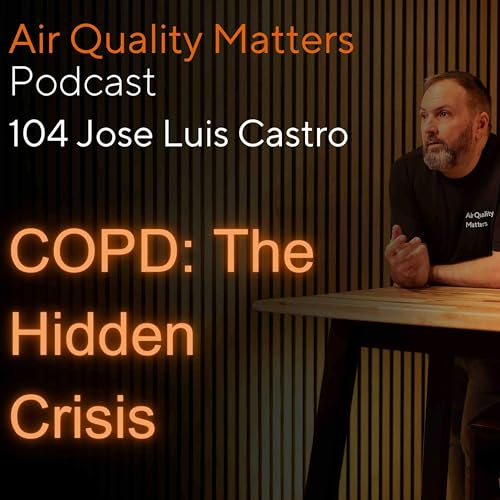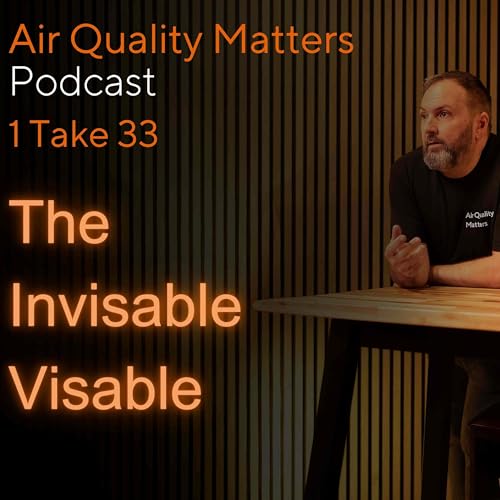Welcome back to a solo episode—it's just me this week, fresh off a plane from Las Vegas and the AHR Expo, and honestly, in a bit of a reflective mood. When you spend a week inside the ultimate sealed box that is Vegas—losing track of time, weather, and what the air is actually doing—it puts things in perspective. It's comfort manufactured at massive scale, designed to keep you sedated, happy, and spending money. And stepping back into the real world, looking at the sheer volume of noise landing on my desk—commissions, pledges, papers, announcements—I had to pause. The Central Question On one hand, we've never had more attention. We have the Global Commission on Healthy Indoor Air launching at the UN. We have the Global Pledge. We have Ashrae's new Indoor Environmental Quality Centre of Excellence. It feels like the ground is moving. But on the other hand, I look at who's in the room. I look at the jostling for position. And I have to ask: Is this a genuine revolution, or is it a narrative grab? Are we drawing a line in the sand for public health—or building a new VIP section for the haves, while the have-nots are left outside in the smog? Key Topics Discussed: The Narrative Grab: What happens when a grassroots movement gains enough momentum to become valuable—and the big institutions, legacy corporations, and governing bodies realize they need to own a piece of that story. Is the commission a natural reaction of a sector trying to organize itself? Absolutely. But is it also a narrative grab? Potentially, yes. Who's in the Room—and Who Isn't: When I scroll through the lists of participants and commissioners, I see a lot of familiar names. Big HVAC. Controls. Sensors. Certification bodies. Real estate. Western academics. But where is the social science? Where are the voices from the Global South—not satellite offices, but grassroots? Where are the housing activists fighting damp and mold in public housing? It feels heavy on corporate real estate, heavy on Western technocracy. The Risk of Premium Air: When you turn health into a premium product, you create a two-tier system: platinum-class air for Google headquarters, and the rest of us—schools with windows painted shut, social housing with fans that haven't worked since 2015, industrial units thick with process dust. If the narrative becomes owned by commercial real estate, does clean air become a luxury good you buy, rather than a fundamental human right that is owed? The Mandate Debate: A fascinating clash playing out in the academic literature right now. On one side, a paper in Science led by Lidia Morawska and others: Mandating Indoor Air Quality for Public Buildings. Bold, noble, seductive—strict numerical legal mandates for IAQ in public spaces. On the other side, a response from the folks at ISO TC 146 SC 6 and ASTM D22, raising a critical point: is a global mandate actually workable, or even dangerous? What happens when you apply a Western technological fix to a context that simply cannot support it? Indoor Environmental Quality—The Big Brother of IAQ: Intellectually, it makes sense. We have eyes, ears, skin, as well as lungs. But I'm terrified that air quality is going to get lost in this mix. We've spent decades trying to get people to care about the invisible. Now compare that to thermal comfort—if the room is two degrees too cold, complaints light up instantly. If we bundle IAQ into IEQ, my fear is the budget goes to the things people complain about. The money goes to new LED lighting, sound dampening panels, heat pumps—and the ventilation? Well, as long as nobody's fainting, we'll value-engineer the filters. The Air Quality Matters Podcast in Partnership with Farmwood (https://farmwood.co.uk/) - Eurovent (https://www.eurovent.eu/) - Aico (https://www.aico.co.uk/) The One Take Podcast in Partnership with SafeTraces (https://www.safetraces.com/) and Inbiot (https://www.inbiot.es/?utm_campaign=simon&utm_source=airqualitymatters&utm_medium=podcast) Do check them out in the links and on the Air Quality Matters Website. (https://www.airqualitymatters.net/podcast) If you haven't checked out the YouTube channel its here (https://www.youtube.com/@airqualitymatters-SimonJones). Do subscribe if you can, lots more content is coming soon. Chapters 00:00:00 Introduction: Reflections from Vegas and the Sealed Box Experiment 00:03:24 The Global Commission on Healthy Indoor Air: Progress or Narrative Grab? 00:04:47 Who's Missing from the Table? The Representation Problem 00:06:02 The Narrative Grab: When Air Quality Goes Mainstream 00:08:13 The Premium Product Problem: Clean Air as a Luxury Good 00:13:04 The Mandate Debate: Science Paper vs. Practical Reality 00:15:51 The Parachute Solution: Why One-Size-Fits-All Standards May Fail 00:19:00 Indoor Environmental Quality: The Marvel Movie Problem 00:24:38 The Broken Delivery System: When Platinum Buildings Fail 00:28:12 The Path Forward: From Talking Shops to Ground Truth
続きを読む
一部表示
 2026/02/1912 分
2026/02/1912 分 1 時間 43 分
1 時間 43 分 11 分
11 分 2026/02/0932 分
2026/02/0932 分 11 分
11 分 2026/02/021 時間 35 分
2026/02/021 時間 35 分 2026/01/2812 分
2026/01/2812 分 2026/01/261 時間 58 分
2026/01/261 時間 58 分
